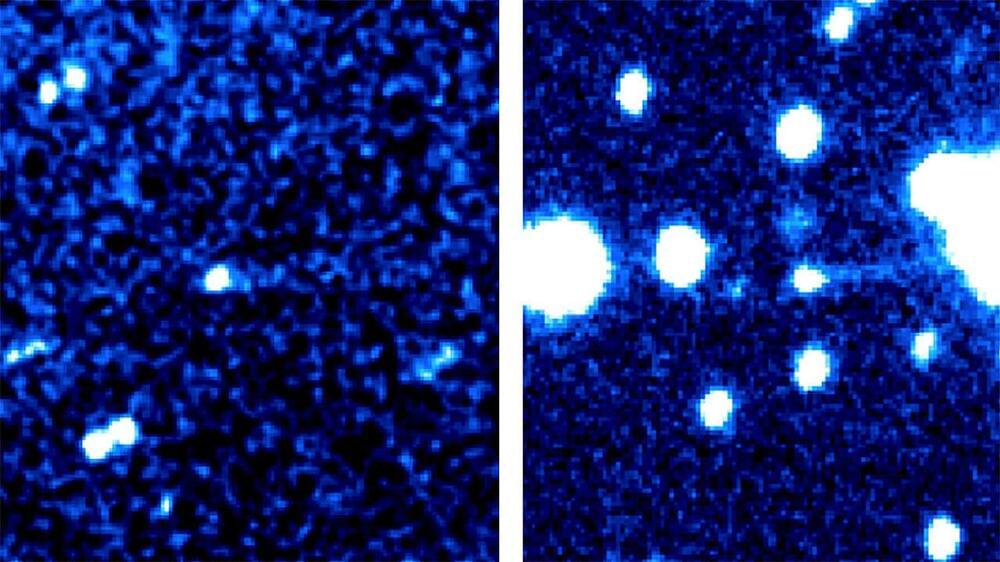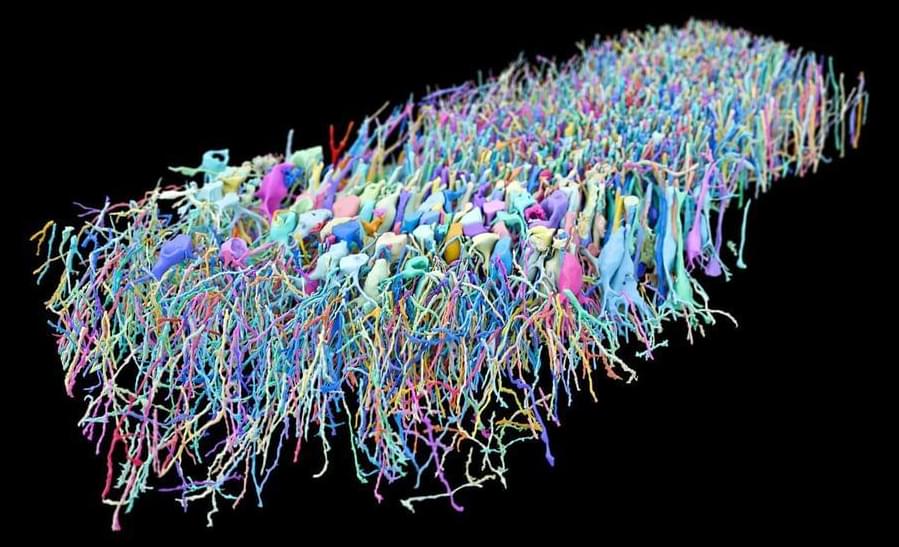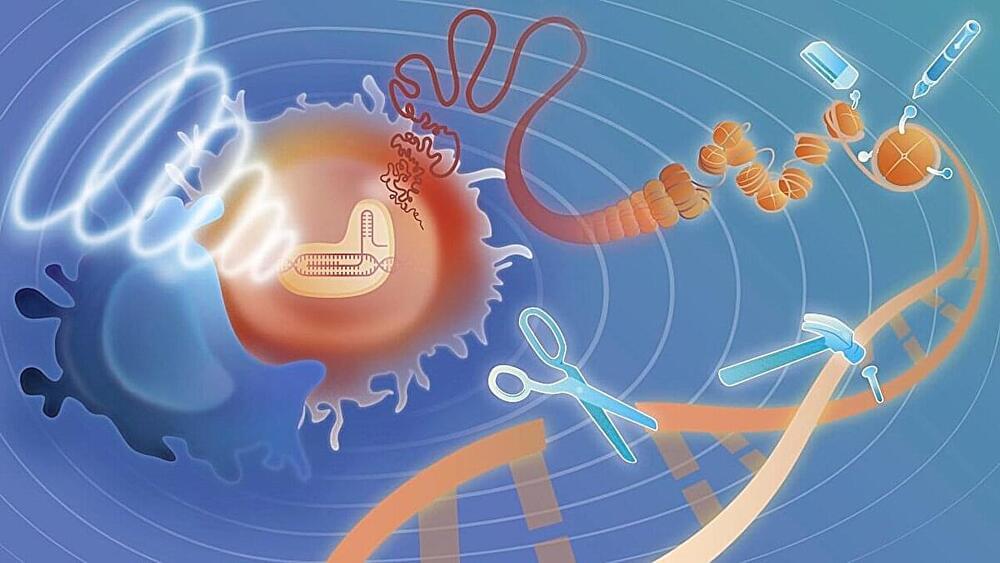The Dutch scientist designs the world’s smallest machines, including light-activated drugs to improve treatments for cancer and infection.


Scientists developed a DNA-based molecular controller that autonomously directs the assembly and disassembly of molecular robots, a key approach with potential applications in medicine and nanotechnology.


A mysterious object discovered in the main asteroid belt in 2021 was determined to be a main-belt comet by Planetary Science Institute Senior Scientist Henry Hsieh, Scott Sheppard of the Carnegie Institution for Science and Audrey Thirouin of Lowell Observatory.
Main-belt comets are icy objects found in the asteroid belt between Mars and Jupiter—rather than the cold outer solar system where icy bodies are typically expected. They sport comet-like features, like tails extending away from the sun or fuzzy clouds as the sun’s heat vaporizes their ice. They were first discovered in 2006 at the University of Hawaii by Hsieh and his then-doctoral advisor, David Jewitt.
Main-belt comets belong to a larger group of solar system objects known as active asteroids, which look like comets, but have asteroid-like orbits in the warm inner solar system. This larger group includes objects whose clouds and tails are made of ejected dust produced after an impact or as they quickly rotate, rather than just those that eject dust due to vaporized ice. Both main-belt comets and active asteroids in general are still relatively rare, but scientists are discovering them at a growing clip.

Discovered in 1999 in Germany, the Nebra Sky Disc is the oldest known depiction of the cosmos. A recent examination of the Bronze Age artifact revealed the intricate methods used in its creation, which UNESCO described as “one of the most important archaeological finds of the twentieth century.”
The Nebra Sky Disc is a product of the Únětice culture, which originated in the Bronze Age of Central Europe. It reflects a sophisticated ancient understanding of both metalworking and astronomy and was created sometime between 1800 and 1,600 BCE. Clusters of stars, a sun, and a crescent moon are among the celestial bodies depicted by golden inlays covering the blue-green patina of the Nebra Sky Disc. The angle between the solstices is thought to be indicated by two golden arcs that run along the sides of the disc, one of which is now absent. It is thought that a boat is represented by another arc at the composition’s base. Only a few millimeters thick, the disc has a diameter of around 12 inches.
The Nebra Sky Disc is one of the best-investigated archaeological objects. The origin of the raw materials it is made of is well known The disc is made from copper, tin, and gold—materials whose origins have been traced to Cornwall, England. The rich blue-green patina of the disc’s bronze today results from chemical changes over time. Originally, it would have been a deep bronze hue.

The AI race is heating up! In this video, we delve into the competition between Nvidia’s Llama-3.1 and OpenAI’s GPT-4. Discover how these two AI giants are revolutionizing the field of large language models (LLMs) and reshaping AI performance benchmarks. From Nvidia’s groundbreaking Llama-3.1 Nemotron to GPT-4’s advanced video generation capabilities, we analyze their strengths, use cases, and potential to lead the AI revolution.
Topics covered:
Nvidia Llama-3.1 vs. OpenAI GPT-4: Performance benchmarks.
How to use Nvidia Llama-3.1 Nemotron-70B
AI in video generation: OpenAI’s GPT-4 and Nvidia AI animation.
Nvidia AI benchmarks, GPUs, and requirements.
OpenAI vs. Nvidia: Who’s winning the AI race?
Llama GPU requirements and running Llama without a GPU
Stay tuned to learn which of these tech titans might dominate the future of AI innovation!
Queries:
the AI race.
the race AI cover.
the first AI race.
to dominate the AI race.
who is winning the AI race.
who will win the AI race.
off to the races AI cover.
nvidia llama 3.1
nvidia llama 3.1 nemotron.
nvidia llama 3.1 nemotron 70
how to use nvidia llama 3.1
openai’s gpt-4
nvidia AI nemo.
nvidia AI animation.
nvidia AI benchmarks.
gpt4all vs llama.
openai gpt 4
gpt-4 video generation.
openai h100
openai nvidia.
openai’s gpt-3.5
gpt 4 vs llama.
openai 4
openai gpu.
gpt 3 or 4
4 gpt ai.
openai nvidia gpu.
nvidia AI performance.
nvidia llm.
llm nvidia.
how to use nvidia.
llama-3.1-nemotron-70b-instruct.
nvidia llama.
llama gpu.
nvidia llama 3.1 api.
nvidia AI llama 3.1
llama nvidia.
llama without gpu.
llama requirements gpu.
openai nvidia.
nvidia gpt.
openai nvidia gpu.
openai’s gpt-4
openai’s gpt-4
gpt4 vs llama.
gpt-4 vs llama.
4 gpt ai.
Nvidia AI Nemotron.
OpenAI GPT-4 applications.
GPT-4 vs Llama-3.1 detailed review.
Nvidia AI advancements 2024
OpenAI’s GPT-3.5 vs GPT-4 comparison.
Future of LLMs: Nvidia vs OpenAI
AI tools for video generation.
Nvidia AI GPUs and requirements.
Who will win the AI race? Nvidia vs OpenAI
Nvidia Llama-3.1 vs GPT-4 comparison.
OpenAI GPT-4 vs Nvidia Llama performance.
Nvidia Llama-3.1 Nemotron-70B explained.
How to use Nvidia Llama-3.1 AI model.
AI race 2024: Nvidia vs OpenAI showdown.
GPT-4 video generation vs Nvidia AI animation.
Nvidia AI benchmarks and performance in 2024
Llama GPU requirements: Can you run it without a GPU?
What is Nvidia Llama-3.1 Nemotron?
Nvidia Llama-3.1 Nemotron-70B vs GPT-4: Which is better?
AI race: Who will dominate, Nvidia or OpenAI?
How to use Nvidia Llama-3.1 API for AI projects.
GPT-4 video generation: Is OpenAI leading the AI race?
Nvidia AI vs OpenAI: Benchmarks and features compared.
Llama-3.1 vs GPT-4: Pros, cons, and use cases.
Nvidia AI animation and OpenAI video generation tools.
Best GPU for running Nvidia Llama models.
OpenAI H100 and Nvidia Llama: A performance comparison.
Nvidia AI performance benchmarks: 2024 updates.
@airevolutionx.
@AI.Uncovered.
@ChatGPT-AI
@NVIDIA
@TheAiGrid.
@NVIDIAGeForce.
@NVIDIADeveloper.
@OpenAI2025
@Sora. Openai_World.
@NDTV

Thanks to CRISPR, medical specialists will soon have unprecedented control over how they treat and prevent some of the most challenging genetic disorders and diseases.
CRISPR (Clustered Regularly Interspaced Short Palindromic Repeats) is a Nobel Prize-winning gene-editing tool, already widely used by scientists to cut and modify DNA sequences to turn genes on and off or insert new DNA that can correct abnormalities. CRISPR uses an enzyme known as Cas9 to cut and alter DNA.
Engineers at the USC Alfred E. Mann Department of Biomedical Engineering have now developed an update to the tool that will allow CRISPR technology to be even more powerful with the help of focused ultrasound.

♺ DETAILS
A pair of researchers, one with the Carnegie Institution for Science, the other with California Institute of Technology, has developed a possible solution to the Fermi Paradox. In their paper published in Journal of the Royal Society Interface, Michael Wong and Stuart Bartlett suggest that the reason that no aliens from other planets have visited us is because of superlinear scaling, which, they contend, leads to a singularity. (How do “Predator Civilizations” solve the Fermi Paradox?)
♺ Our Channels:
◻️ Evil Space — https://www.youtube.com/@DeepEvilSpace.
◻️ Espacio Profundo — https://www.youtube.com/@EspacioProfundo.
◻️ Raumfahrt — https://www.youtube.com/@Celeo_PT
◻️ L’ère de l’espace — https://www.youtube.com/channel/UC9BQnoR8w4KhHjVUGATg8Cw.
◻️ Weltraumreise — https://www.youtube.com/@Weltraumreise.
◻️ Space Journey — https://www.youtube.com/@SpaceJourney_
◻️ Злой Космос — https://www.youtube.com/@UC-RyhIEG3is1Sfe70-dHYQw.
♺ ANIMATION:
Jeremy jozwik: https://www.artstation.com/zeuxis_of_… Demin: https://www.artstation.com/darth_biomech Kristiityan Tavkar https://www.miragedereve.com Kris Holland of Mafic Stufios: www.maficstudios.com Sergio Boterio https: https://www.artstation.com/sboterod Bryan Versteeg http://spacehabs.com Keith Carson, Jarred Eagley, Udo Schroeter, Mihail Yordanov, Katie Byrne, Edward Nardella, Jarred Eagley, Justin Dixon, Misho Yordanov, Pierre Demet. Stefan Blandin. ♺ SOURCES: